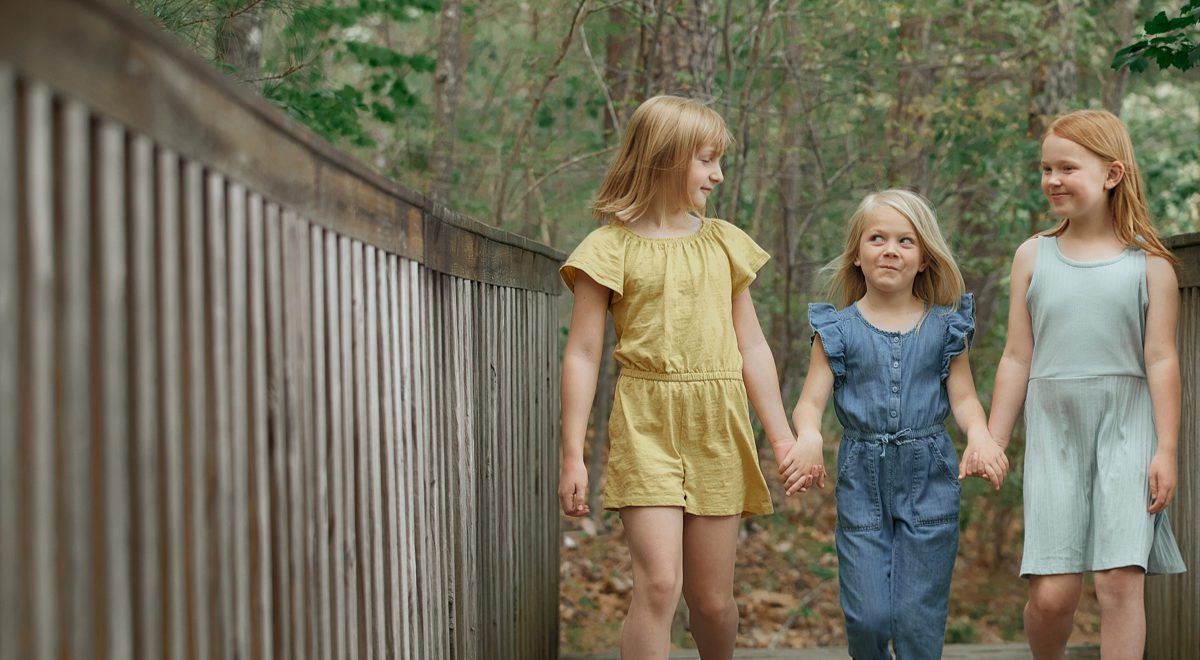Do you know what your favorite sound in the world is?
I know mine. It’s when I hear our children laughing and playing and talking together in another room. There is nothing that warms my heart quite like hearing those kids enjoying being around each other. And when I hear it, I’m moved to pray for more and more moments like this in the future. That’s because I know there will come a day when the kids move out of the house, when they start their own careers and their own families, and even when Jana and I are gone, when they will have to make the choice to relate to one another.
And I want them to be more than brothers and sisters – I want them to be friends. I want them to enjoy being around each other even without Jana or I as the link that holds them together. It seems like friendships between our children can be fostered and encouraged in these days when they are young, so that when they are old, their relationships continue to hold together. But if those relationships can be fostered, they can also be hindered by certain practices in the home.
If you, like me, want this for your kids – for them to enjoy being together to the extent that they choose to be friends when they are older – then we ought to pay attention to those things which might be obstacles to the formation of those relationships. Here are three such obstacles:
1. Media.
It’s so easy, isn’t it? Just turn on the TV. Or let them play video games. Or allow them to put their noses in their own devices. It’s certainly good for parents who need a break, and it’s also easier than listening to the inevitable squabbling that comes when you have multiple kids in the house. That’s not always a bad thing. We certainly consume our fair share of media in our home, and I don’t feel particularly badly about doing so.
Nevertheless, the amount of media our kids have access to can be a serious obstacle to their friendships with each other. When media is always an option, they are never put in a situation when they have to learn to relate to each other. There is always a retreat in which they don’t have to talk, negotiate, or understand another person. Conversely, when we make the choice to limit the amount of access our kids have to media, they often have no other choice than to learn to play with and enjoy their siblings. This is a rough road to travel as a parent – it’s certainly not the easiest one. But it is, I believe, the road with lasting benefit.
2. Schedule.
Busyness is the plague of the modern family. We stretch ourselves so thin that we fall into bed exhausted every night between ball games, dance practice, homework, school clubs, sleepovers, and everything else. When we overburden the family calendar, one of the effects is that our kids are often participating in different activities that happen at the same time. Parents are split between this thing and that one, and the kids never have the opportunity to actively watch their brothers or sisters do “their” thing.
They can’t go to the band concert because they have a baseball game of their own. They can’t go to the art show because they have a science project due. They can’t applaud, cheer, encourage, and yes, embarrass their siblings at their events because they’re consumed with their own. So the schedule we keep can be a major detriment to the formation of relationships between our kids because they never have the chance to take pride in or console their siblings.
3. You.
Yes you. And me. And this one is hard, because the greatest obstacle to our children being friends with each other might be us. How does that happen?
It happens through the best of intentions. As parents, we feel compelled to step into situations between our kids. We feel the need to regulate, to discipline, to force compromise – we want to bring resolution and peace to arguments and disputes that we think our kids aren’t working out on their own. But if we are constantly in the middle of the relationships between our children we should not be surprised when they don’t have any real relationships with each other.
So consider, well-meaning parent, stepping back and forcing them to work things out on their own. Consider making this your first question whenever a child presents an issue to you about their brother or sister: “Have you talked to him or her about it?”
These are obstacles. Think through them. And then, by God’s grace, take some active measures to try and facilitate these relationships. Pray for your kids to grow in their relationships with one another so that when you’re not there any more, they will still want to be with each other.
Michael Kelley lives in Nashville, Tenn., with his wife, Jana, and three children: Joshua, Andi, and Christian. He serves as the Sr. Vice President of Church Ministries for Lifeway Christian Resources. He is the author of Growing Down: Unlearning the Patterns of Adulthood that Keep Us from Jesus, Wednesdays Were Pretty Normal: A Boy, Cancer, and God; Transformational Discipleship; and Boring: Finding an Extraordinary God in an Ordinary Life.
This post originally appeared on michaelkelley.co.


 You know you’re in kidmin when …
You know you’re in kidmin when … »
»